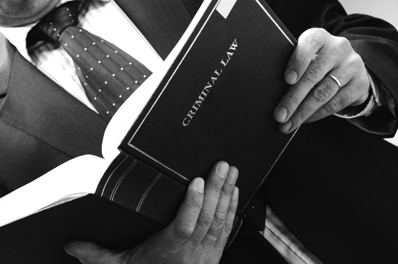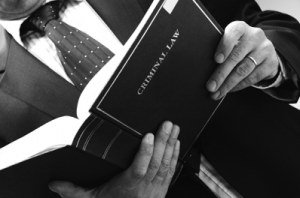Choose The Right Criminal Appeals Lawyer
The Criminal Appeals Lawyer
If you have been convicted of a crime, one of the most important decisions you will ever make is choosing the right criminal appeals lawyer. Whether you are appealing to the Appellate Division in New York, to the New York Court of Appeals, the Federal Circuit Courts of Appeal or the United States Supreme Court, choosing the right criminal appeals lawyer is not just important, it is everything.
I have dealt with all types of criminal appeals in Federal Courts throughout the nation, all the Appellate Courts in New York State, as well as the United States Supreme Court. I have successfully handled every type of criminal appeals issue under both the U.S. Code and the New York Penal Law. From murder, to drug dealing, to RICO racketeering, to white-collar crime, there is no substitute for experience and expertise in the area of criminal appeals.
I take a unique approach to each criminal appeal that I handle. Whether it is a Federal Criminal Appeal or a Criminal Appeal in New York State, each case is analyzed on its individual facts, each legal issue thoroughly researched, and each argument is revised numerous times before it is submitted to the Appellate Court in a brief. I cannot emphasize the importance of scrutinizing the record of the lower court exploring for legal issues. This is the most time consuming process of a criminal appeal, but, if done correctly, copiously supplies the substance for each legal issue to be asserted in the final brief.
Read below in detail about the various phases of the criminal appeals process, and then give me a call. We will sit down in my office (free consultation) and discuss the next step to your criminal appeal.
CALL 1-800-APPEALS to speak to an appeals lawyer today at no cost.
 Phases Of The Criminal Appeal
Phases Of The Criminal Appeal
In every appeal, whether in State Court or Federal Court, there are multiple phases. They include filing the notice of appeal, obtaining the records, reviewing the records to determine which legal issues should be brought to the attention of the appellate courts, researching each legal issue, writing the brief and performing oral argument before an appellate panel.
Each of the phases listed above are equally important. Each one must be carried out with the utmost care and diligence, so that the appealable issues are preserved for the client, and each legal issue can be effectively argued to the appellate courts.
The Notice of Appeal
Filing the notice of appeal in a timely manner is extremely important. The filing of this document is, in fact, a jurisdictional requirement. In other words, the appellate courts cannot even entertain an argument on any case before the notice of appeal is filed.
Depending on which court you are appealing from, there are various filing deadlines for the notice of appeal. The deadlines are very, very short for filing this document. Choosing the right criminal appeals lawyer, one who knows when and where to file a notice of appeal, is crucial to this phase of the criminal appeal, and crucial to getting to the next step.
The Record On A Criminal Appeal
Obtaining the records from the trial court is another vital part of the criminal appeals process. The trial transcripts or plea transcripts, and all of the relevant documents, must be submitted to the appellate courts for review. Including these materials and the records from the trial courts is imperative for making accurate references to accompany the legal arguments in the brief. The Appellate Courts must have the records from the lower courts in order to review the facts of your case and to determine how the law should be applied.
Reviewing the records and transcripts from the trial court is the most significant phase of the appeal. In this phase the legal issues to be presented to the appellate court are discovered by the criminal appeals attorney. Significant amounts of time must be dedicated to reviewing the records and exploring legal issues. In this phase, there is no substitute for experience and familiarity with criminal law issues.

Legal Research For A Criminal Appeal
Legal research is, of course, essential to any criminal appeal. The legal research phase is always combined with the phase of reviewing the record. As the criminal appeals lawyer peruses the record, each legal issue that is discovered must be researched thoroughly. As one might imagine, this process takes appreciable amounts of time, but it is time well spent and well worth the effort. Here, the decision to include or exclude appealable issues is made. Which issues will be raised and the structure of the legal arguments, both of critical importance to the success of the criminal appeal, are decided in this phase.
Writing Legal Briefs For Criminal Appeals
Writing arguments that are persuasive is the objective of every appellate brief. The brief is the end product submitted for the appellate judges review. It must be a combination of compelling legal argument, powerful storytelling and captivating prose. Most importantly, it must persuade. Orchestrating the right medley of legal argument and correctly structuring the cadence of legal issues for maximum effect requires experience ? experience in writing briefs ? experience in handling criminal appeals ? experience in performing oral argument. Each stage of an appeal is significant for different reasons, and must be handled with great care and attention.
Oral Argument On Criminal Appeals
Oral argument is unique to the appeals process. Because the appellate courts are structured differently than the trial courts, the criminal appeals lawyer must tailor the arguments to that forum. For example, at trial, there is one judge, possibly a jury of 12 people, and evidence is presented to jurors through witnesses. The appellate courts are completely different. At the appellate level, a panel of judges will decide your case. The panel of judges will hear arguments on the law and how the law should be applied to the facts that were presented at trial. The appellate court will hear no new facts or witnesses, and appellate panels frown upon the passionate arguments typically presented to a jury. With this in mind, the criminal appeals lawyer must be prepared to make only legal arguments based on the facts presented in the court below.
The number of judges on the panel depends on which appellate court is hearing the appeal. For example, in the Appellate Divisions in New York there are either 4 or 5 judges on a panel depending on which Department you are in. At the Court of Appeals (New Yorks highest Court) there are 7 Judges. In the Federal Circuit Courts there are panels of three judges and, of course, in the United States Supreme Court there are nine Justices.
At oral argument the attorney will have a brief period of time (usually minutes) to answer the questions of the panel judges. Although the time spent at oral argument is short, it is of momentous importance because, for the first time, the attorney hears the questions and thoughts of the judges. This is a unique opportunity to persuade. When a judge has revealed his/her thinking through his/her questions, the criminal appeals attorney is presented with opportunity to persuade the judge(s) and present the strongest part of the clients argument. At oral argument there is no substitute for experience. Choosing the right criminal appeals lawyer is, therefore, essential.
Knowing The Appellate Courts
The importance of knowing which appellate court to appeal to cannot be overestimated. This sounds like I am being facetious, but Im not. Dont laugh, I have had many attorneys (with 20 plus years of experience) call me to ask which appeals court they should go to in order to appeal a case. And I am not writing this to be critical in any way of those attorneys. Whether a case is Federal or in a New York State court, the legal system can often be a maze of rules and procedural law that is difficult to decipher. Unless you regularly practice in these courts, it can become daunting and confusing. Choosing the right criminal appeals lawyer, one who has experience and knowledge in these areas is critical to getting to the appropriate court.
Going Forward To The Highest Court: What If You Lose On The First Round?
What if you lose the first round of appeals? Knowing your rights and how to get to the next level is not just important; it is everything. Please call me for more information on the next steps in the criminal appeals process including petitions to the New York Court of Appeals, the United States Supreme Court, Writs of Habeas Corpus and Writs of Errors Coram Nobis.

